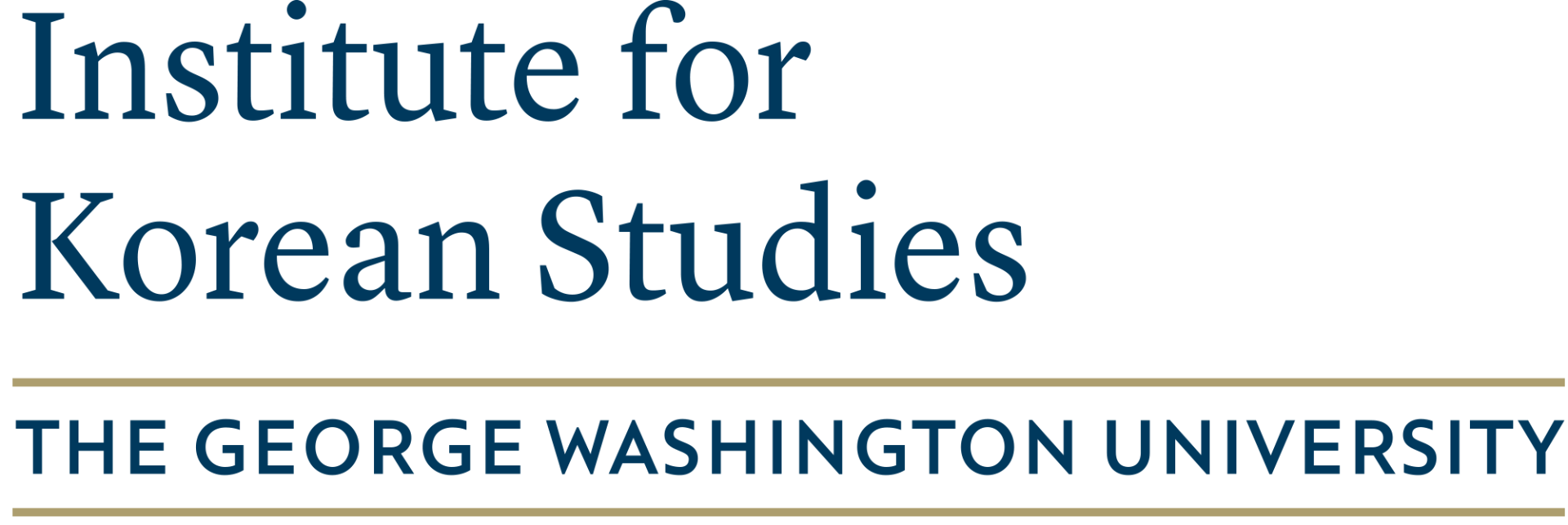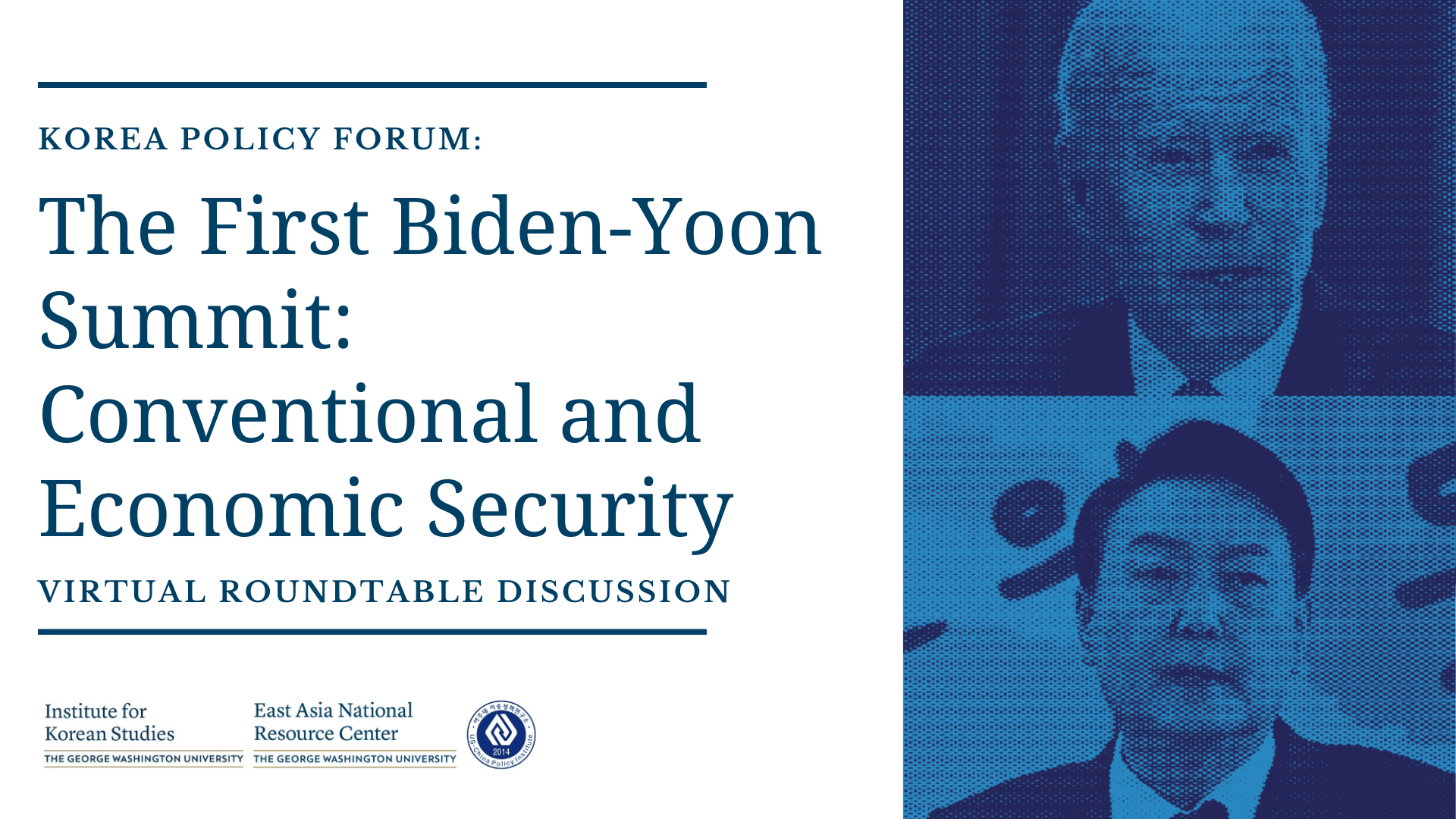Korea Policy Forum
The First Biden-Yoon Summit: Conventional and Economic Security
Tuesday, May 17, 2022
9:00 AM – 10:30 AM EDT
Zoom Event
U.S. President Joseph Biden and South Korean President Yoon Suk-yeol will have their first summit meeting on May 21. With the conflict in Ukraine and U.S.-China relations facing a crucial point, the new Yoon government must navigate a new diplomatic and economic landscape in the regional and global contexts. Amid the uncertain international dynamics, North Korea’s recent tests of an advanced missile system and the potential for a new nuclear test pose an even greater challenge to the two allies. The upcoming U.S.-ROK summit will shed a light on the pressing need for a cooperative approach to these challenges. Please join the GW Institute for Korean Studies for an online discussion with experts who will be discussing views from the United States and South Korea on conventional and economic security for the alliance.
Registered guests will receive a confirmation email with details for joining the virtual event.
This event is on the record and open to the public.
Speakers
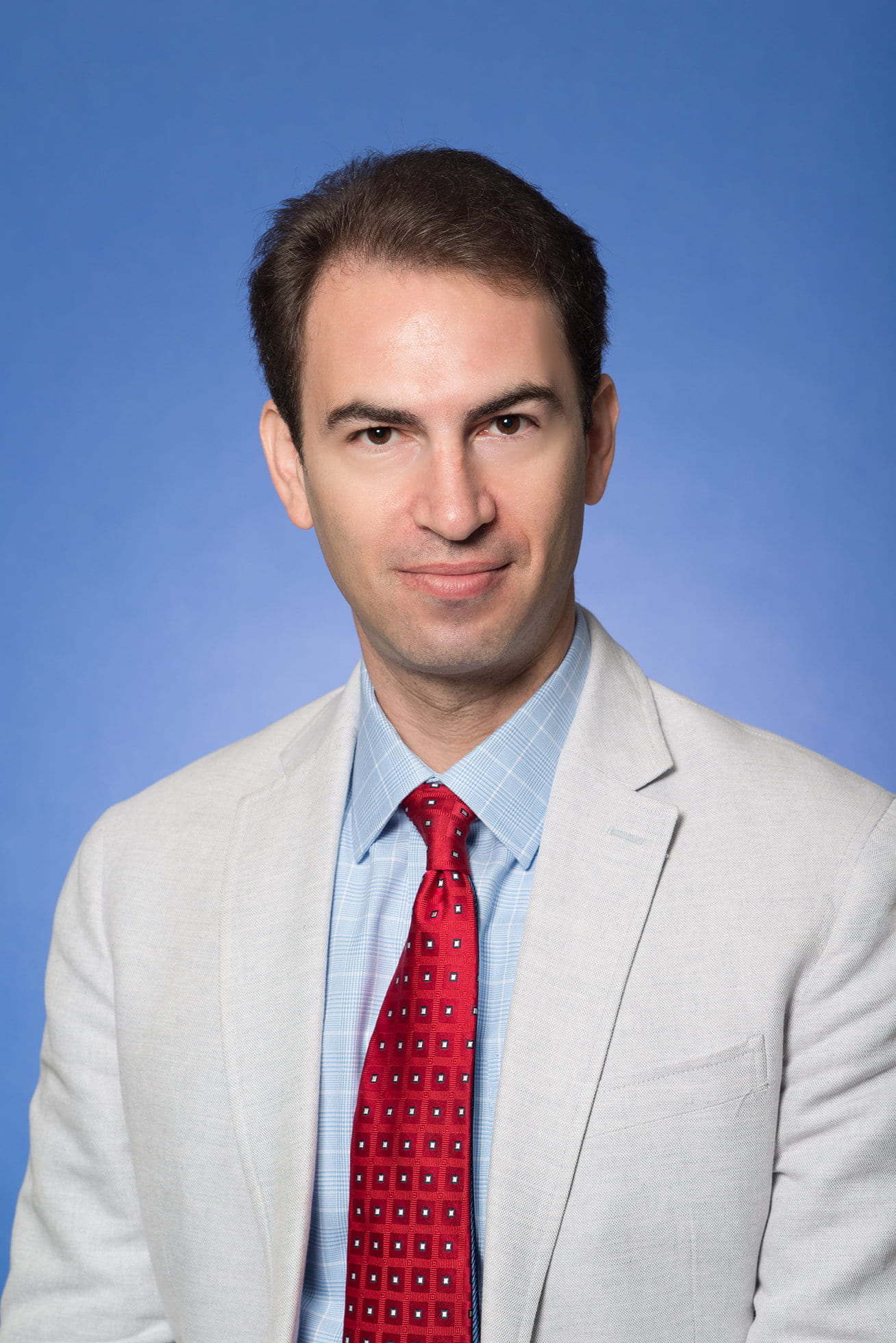
Gregg A. Brazinsky is Professor of History and International Affairs and Deputy Director of the Institute for Korean Studies at GW. He also serves as Director of the Asian Studies Program at the Elliott School of International Affairs. His research seeks to understand the diverse and multifaceted interactions among East Asian states and between Asia and the United States. He is the author of Nation Building in South Korea: Koreans, Americans, and the Making of a Democracy (University of North Carolina Press, 2007) and Winning the Third World: Sino-American Rivalry during the Cold War (University of North Carolina Press, 2017). He served as Interim Director of the GW Institute for Korean Studies during the Spring 2017 semester. He received his Ph.D. from Cornell University.

Du Hyeong Cha is a North Korea study expert who has completed various research projects on topics such as North Korean politics and military, U.S.-ROK alliance, and national crisis management. He is the Principal Fellow of the Asan Institute for Policy Studies, holding an additional post as Visiting Professor at the Graduate Institute of Peace Studies at Kyung Hee University. He also has served as an Adjunct Professor at the University of North Korean Studies (2017-2019), Senior Foreign Affairs Advisor to the Governor of Gyeonggi Provincial Government (2015-2018), Visiting Scholar at the Korea Institute for National Unification (2015-2017), and the Executive Vice President of the Korea Foundation (2011-2014). He was also a Research Fellow at the Korea Institute for Defense Analyses (KIDA, 1989-2012) and the Acting Secretary for Crisis Information to ROK President Lee Myung Bak (2008). He has worked for more than 20 years at KIDA in various positions including Director of the Defense Issues Task Force (2005-2006), Director of Arms Control Research (2007), and Director of North Korea Studies (2009). Dr. Cha received his M.A. and Ph.D. in Political Science from Yonsei University. He has written more than 100 research papers and co-authored books on diverse fields of security and international relations. He has advised for various governmental organizations.

Seonjou Kang is a Professor at the Korea National Diplomatic Academy-Institute of Foreign Affairs and National Security (KNDA-IFANS). Her research centers on rules-based international order/global governance, geo-economics of Asian regionalism, and middle power diplomacy. Her widely cited in-house papers include “G7 Summit 2021 and the Post-Pandemic International Order,” “Global Response to COVID-19: Politicization of Infectious Diseases and Decline of Global Cooperation,” “U.S.-China Competition for Monetary Finance Hegemony,” “The U.S. Indo-Pacific Strategy as Geo-economics,” “U.S. President-Elect Trump’s Foreign Economic Policies: Their Feasibility and Implications,” “Two-Year Performance Assessment of the Asian Infrastructure Investment Bank: China’s Economic Statecraft or a Multilateral Development Bank?”. She also published academic research in Korean Journal of International Studies (2020, 2015), European Journal of Political Research (2007), The Journal of Politics (2005), and Journal of Peace Research (2004). She received her Ph.D. in political science from Michigan State University in 2000. Her other degrees are a B.A. in international relations and an M.A. in political science both from Seoul National University in Korea.

Heung-Kyu Kim is the founder and Director of U.S.-China Policy Institute and professor in the Department of Political Science at Ajou University. He also served as a professor at the Institute of Foreign Affairs and National Security in South Korea’s Ministry of Foreign Affairs. His current assignments include Policy Advisory Board Member for the Ministry of National Defense and ROK Army and Chairman of the Foreign Ministry’s Reform Commission. He also served as Director of Foreign Affairs Subcommittee on the Presidential Commission on Policy Planning, Team Leader of Security and Defense in the Presidential Task Force of Future Vision 2045, a board member of the National Security Council and a board member of National Defense Reform Commission. Dr. Kim’s publications include China and the U.S.-ROK Alliance: Promoting a Trilateral Dialogue (CFR, 2017), Enemy, Homager or Equal Partner?: Evolving Korea-China Relations (2012), From a Buffer Zone to a Strategic Burden: Evolving Sino-North Korea Relations during Hu Jintao Era (2010). His book China’s Central-Local Relations and Decision-Making received an award for Excellency of the Year by the Ministry of Culture in 2008. He also received the NEAR Foundation Academic prize of the year in the area of foreign policy and security in 2014. Kim received his BA and MA in international relations from Seoul National University and Ph.D. in Political Science from the University of Michigan.
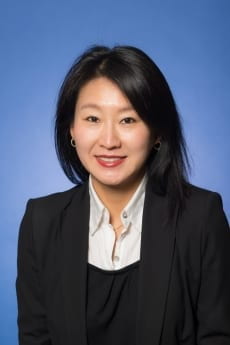
Jisoo M. Kim is Korea Foundation Associate Professor of History, International Affairs, and East Asian Languages and Literatures. She currently serves as the Director of the Institute for Korean Studies and the Co-Director of the East Asia National Resource Center at GW. She also serves as the Editor-in-Chief of the Journal of Korean Studies. She is a specialist in gender, law, and emotions in Korean history. Her broader research interests include gender and sexuality, crime and justice, forensic medicine, literary representations of the law, history of emotions, vernacular, and gender writing. She is the author of The Emotions of Justice: Gender, Status, and Legal Performance in Chosŏn Korea (University of Washington Press, 2015), which was awarded the 2017 James Palais Prize of the Association for Asian Studies. She is also the co-editor of The Great East Asian War and the Birth of the Korean Nation by JaHyun Kim Haboush (Columbia University Press, 2016). She is currently working on a book project tentatively entitled Sexual Desire, Crime, and Gendered Subjects: A History of Adultery Law in Korea. She received her M.A., M.Phil., and Ph.D. in East Asian Languages and Cultures from Columbia University.

Tami Overby is President of Asia Pathfinders where she advises clients on Asia and trade matters, with a particular focus on Korea. Ms. Overby has over three decades of Asia work, including 21 years living and working in Seoul. Her most recent experiences include four years with McLarty Associates and eight years leading the US Chamber of Commerce’s Asia team while also serving as President of the US Korea Business Council. Ms. Overby’s extensive experience helps American companies compete and prosper in Asia. She worked on the TransPacific Partnership FTA, APEC and the KORUS FTA. Ms. Overby’s extensive Asia experience includes working on both high-profile trade disputes with our government and our Asian trade partners as well on market access and investment issues throughout the region. Ms. Overby sits on the board of The Korea Society as well as the Korea Economic Institute’s Advisory Council and the US-Asia Institute. She received her BS in Business Administration and Management from the University of Arkansas.
Moderator
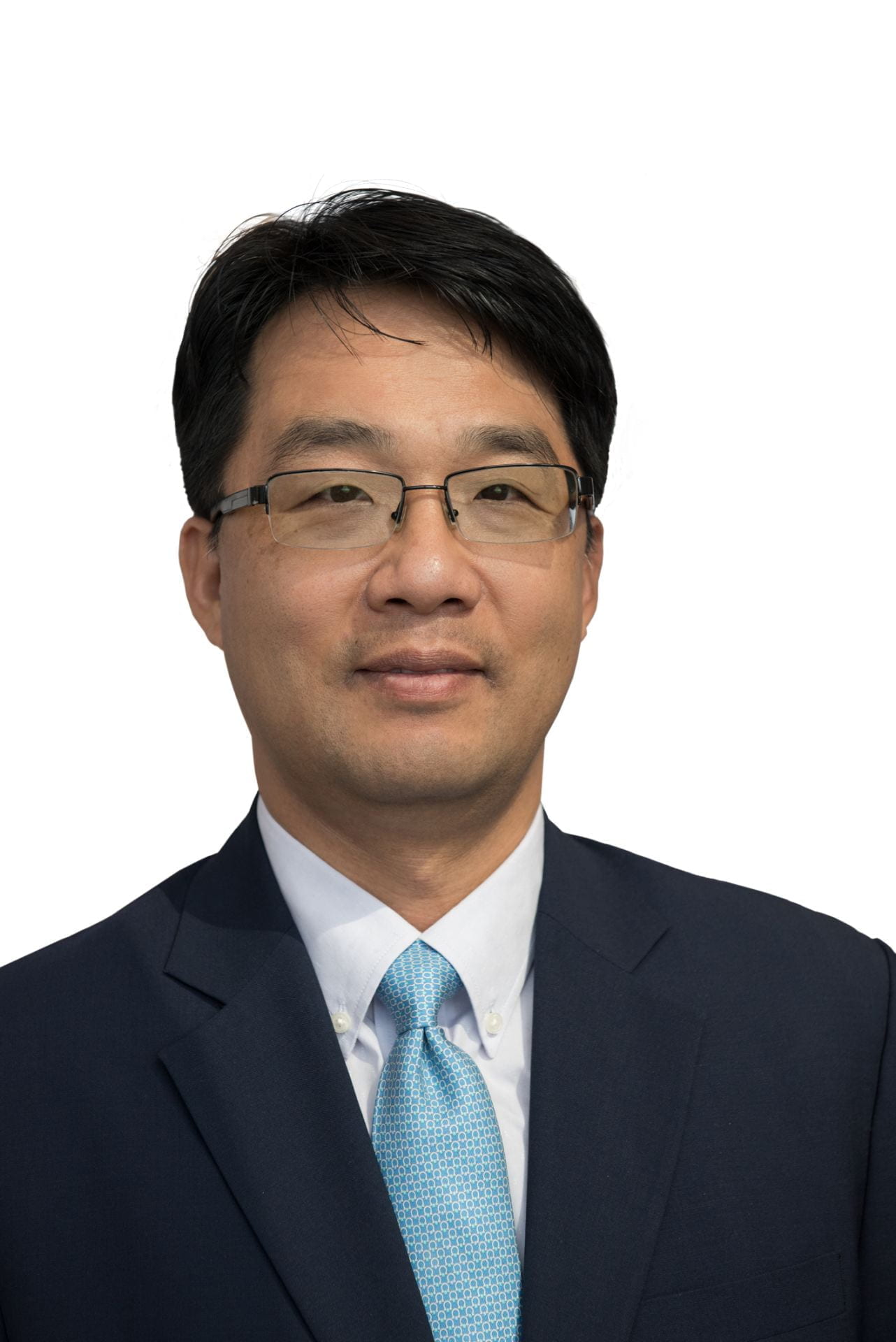
Yonho Kim is an Associate Research Professor of Practice and the Associate Director of GW Institute for Korean Studies. He specializes in North Korea’s mobile telecommunications and U.S. policy towards North Korea. Kim is the author of North Korean Phone Money: Airtime Transfers as a Precursor to Mobile Payment System (2020), North Korea’s Mobile Telecommunications and Private Transportation Services in the Kim Jong-un Era (2019) and Cell Phones in North Korea: Has North Korea Entered the Telecommunications Revolution? (2014). His research findings were covered by various media outlets, including Wall Street Journal, The Atlantic, Yonhap News, and Libération. Prior to joining GWIKS, he extensively interacted with the Washington policy circle on the Korean peninsula as Senior Researcher of the U.S.-Korea Institute at Johns Hopkins University School of Advanced International Studies, Senior Reporter for Voice of America’s Korean Service, and Assistant Director of the Atlantic Council’s Program on Korea in Transition. He holds a B.A. and M.A. in International Relations from Seoul National University, and an M.A. in International Relations and International Economics from Johns Hopkins University School of Advanced International Studies.
